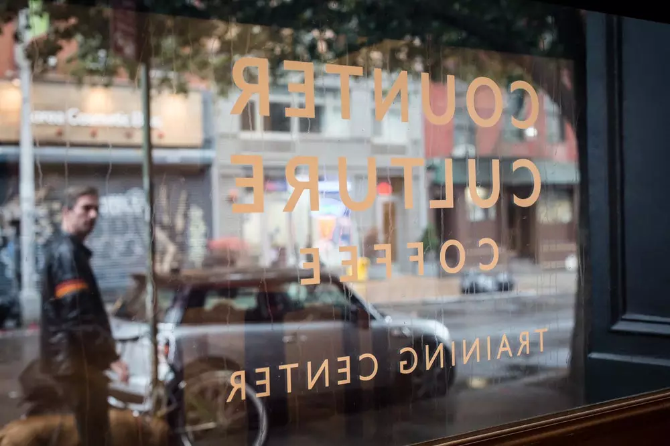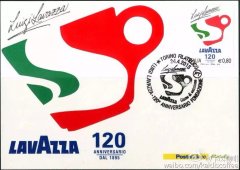Three waves of fine coffee
The third Coffee Wave (2003 ~ present)
Starbucks was hit hard by the 2008 financial crisis, and its shares fell below $10 in early 2009. If it were not for the introduction of VIA instant coffee bags and Frappucino Frappucino cappuccino, life and death would be impossible to predict.
At a time when Starbucks is shrinking its forces and reorganizing its formation, the third wave of cutting-edge boutique cafes is seizing the market reserved by Starbucks' retreat. When it comes to these cafes, it is necessary to mention our three flagships, intellectual Intelligentsia Coffee & Tea, Tree City Stumptown Coffee Roasters, and counter-cultural coffee Counter Culture Coffee. At the beginning, these three stores all have some characteristics: strict requirements for coffee roasting, staff selection and training. Open the store arrogantly next to Starbucks. I'm not afraid of Starbucks, but I'm afraid that coffee is inferior to others. This spirit runs through the third wave of coffee, and even now, in China, Mr. Zhang often sees people compare the third wave of cutting-edge cafes with Xing Dad and criticize the latter.
Intelligentsia Coffee & Tea
Intellectual coffee
Since the launch of the American barista contest (ABC, America Barista Championship) in 2003, intellectuals have won four championships, among which the defending champion Michael Phillips in 2009 and 2010 also beat European players to win the World barista Competition (WBC, World Barista Championship). Due to winning too many prizes, intellectuals announced that they would no longer participate in the competition in order to maintain the balance of development of the coffee industry.
The most important feature of intellectuals is that it adopted direct trading (direct trade) for the first time. When the store was just opened, they bought raw beans from coffee importers, roasted and extracted well, and were able to make coffee that far surpassed that of the father next door. But the more we do, the more we find that the raw beans are always good or bad in each cup test, which is beyond the control of intellectuals. The two major shareholders decided to go to the producing area to see what was going on with the raw beans. In 2000, their maiden bank chose the Guatemalan region, and Jeff, a shareholder, recalled, "I never thought the manor had many factors that could affect the taste. Different months, soil and water, altitude, variety and the flavor of the coffee were obviously different, and the producing area was the mother of ten thousand flavors." At that time, coffee farmers did not have the concept of boutique, stacked coffee beans from dozens of different estates together, and picked coffee fruits indiscriminately. At this time, coffee farmers are not only producers, but also partners who share weal and woe with fine coffee. Only when coffee farmers are fattened can they grow good coffee. Big consumers should provide the latest technology, improve quality and cooperate with coffee farmers.
As a result, direct trading was born, and the direct trade between cafes and coffee farmers directly exploded the transparency of fine coffee (transparency). People began to know the environmental characteristics of the coffee production place, and the precise information about whether coffee beans were washed or tanned, and so on. By now, intellectuals have had technical exchanges and cooperation with more than 3,000 coffee farms, and coffee buyers of intellectuals have been visiting coffee producing areas for nine months a year. If the contract signed now does not include the profit of the coffee middleman, the purchase price will fall instead of rising, while the profit of coffee farmers in their pockets will be 20% or 30% higher than before. The purchase price of coffee is based on the cup score, so coffee farmers are happy to breed the best coffee. "Direct trading" is a major breakthrough in the coffee industry!
Intellectual Coffee launched the black cat classic espresso beans (black cat classic espresso), which is roasted in medium to deep depth, probably out of the pot at the beginning of the second explosion, which is very different from the end of the Starbucks second explosion. As black cats always use season beans, the formula is often changed, but the only constant is ultra-high quality, which perfectly interprets the third wave of soft, sour and sweet coffee aesthetics, which is different from the second wave of re-baking. Although it is a concentrated special bean, it is also very compatible with siphon and hand flushing. It is an omni-directional bean.
From 1995 to 2010, intellectuals opened only six stores, two bakeries and a laboratory in Chicago and Los Angeles, in stark contrast to Starbucks, which has opened more than 10,000 stores in just over a decade. In order to ensure quality, intellectual operators gave up quantity, but instead gained more influence in the coffee industry than Starbucks. All coffee practitioners have to find a way to stand in line with the two styles of tearing up between small and sophisticated and large and pan-styled.
Stumptown Coffee Roasters
Shudun City Coffee

If someone watches "a movie about coffee" carefully, they will find that the content of this Stumptown coffee is a large part of the movie.
Tree Pier City is a nickname for Portland, Oregon, where the first shop of Tree Pier Coffee opened in 1999. Although it was four years later than the intellectual's opening in 1995, the limelight was no less than the former, and it was named "New Starbucks" by time Magazine, attracting people's attention.
In the 12 years to 2011, Tree Mound has opened five stores in Portland, two in Seattle, two in New York and one in Holland. Duane (founder of Shudun City) stopped in the Netherlands on his way to Africa, only to find that the Netherlands could not drink good coffee and was far inferior in quality to black coffee drinking countries such as Northern Europe and Britain. So in March 2010, he opened his first overseas store in Amsterdam, and it was the third wave of cafes that extended its tentacles to the United States, which was well received by the Dutch.
Tree Pier City opened a store in Manhattan in September 2009 and is hailed as the coolest coffee shop in the East. Baristas, dressed in 1950s and 1960s gentleman hats and ties, often work with both hands to make coffee. There are only table stands and no seats in the coffee shop, and the most fashionable New Yorkers flock here to try the famous American Hair Bender with espresso or hand-brewed manor coffee. For the business of the New York store, Duane opened a roaster in Brooklyn, New York, to avoid shipping from Portland and reducing the freshness of coffee (Portland is in the westernmost part of the United States, while New York is the easternmost part of the United States, several time zones apart).
In September 2010, the second store in New York opened, called brew bar, which sells only follicular coffee, focusing on six coffee utensils: French presser, Chemex, German hand filter cup Melitta,Hario filter cup V60, Philharmonic pressure and smart cup. There are 35 kinds of coffee beans available in the store according to the production season. I scared duang. ), which also shows that such follicles are beginning to be popular in the United States. Originally thought to be crude and vulgar, all-manual cooking began to counter-attack machine cooking, which was really interesting.
Shu Dun City's "curler" with beans and "black cat" have a lot in common. However, the curler will use more varieties of beans, using wet planed beans from Latin America, Kenya, Yega and Indonesia. When we look at so many shallow and medium-baked sour beans, the flavor should be sharp, right? In fact, the baking technology of Shudun City is superb, making organic acids sweet and fruity, and multiple producing areas bring multiple flavors. If you take a look at the matching beans brought out by the third wave, it is not difficult to find that the third wave of roasting is light rather than deep, which precisely reflects the idea of the third wave of "drinking the original taste of coffee".
Counter Culture Coffee
Counter-culture
In this era of manual filtering of fine coffee, the technical requirements for baristas are getting higher and higher, and we need someone to teach us how to make coffee correctly. Counter-cultural coffee was born.
It is better to teach coffee than to sell coffee. Counter-culture is not a coffee shop that sells coffee, but a mecca for selling cooked beans and coffee teaching. If Shudun City and intellectuals are soldiers fighting at the front, then counter-culture is the Whampoa military Academy that provides re-education for novices and practitioners. There are many courses, such as coffee extraction theory, barista beginner class, competition class, milking chemistry, coffee trade history, variety, treatment, cup test and so on. It's like a coffee college.
Important Notice :
前街咖啡 FrontStreet Coffee has moved to new addredd:
FrontStreet Coffee Address: 315,Donghua East Road,GuangZhou
Tel:020 38364473
- Prev

Judging details of WBC World baristas Competition | scoring details | points for attention
The WBC competition is a worldwide coffee competition that began in 2000. The reason for introducing the rules of the WBC game to coffeeing's friends in detail, I hope you can have a correct understanding of the competition itself. The Organizing Committee of the World Barista Competition is a non-profit organization registered in London, England, which is mainly responsible for organizing the World Barista Competition. The board of directors of the company is Yumi
- Next

Coffee Stamps issued by Italian Post Office
On April 24th this year, the Italian Post Office issued a set of three stamps with the theme of le Eccellenze del sistema produttivo ed economico: 150-year-old Kofley Chocolate, 170-year-old Finnet Blanca bitter, and 120-year-old Rabasa Coffee! There are few stamps issued for brands in the world, which must be paid tribute to brands recognized at the national level.
Related
- Workers collapse! Lucky suspects that it will introduce freshly cut fruits?!
- 1-point subsidy recipients wear thousand-yuan watches?! Local response: For low-income households
- Can lightly roasted coffee beans be used to extract espresso? How finely should you grind high-quality coffee beans to make Italian latte?
- What is the difference between the world's top rose summer coffee and Yejia Shefi? What are the flavor characteristics of Yega Shefi coffee and Panama rose summer?
- The ceremony is full! Starbucks starts to cut the ribbon at a complimentary coffee station?!
- A whole Michelin meal?! Lucky launches the new "Small Butter Apple Crispy Latte"
- Three tips for adjusting espresso on rainy days! Quickly find the right water temperature, powder, and grinding ratio for espresso!
- How much hot water does it take to brew hanging ear coffee? How does it taste best? Can hot water from the water dispenser be used to make ear drip coffee?
- What grade does Jamaica Blue Mountain No. 1 coffee belong to and how to drink it better? What is the highest grade of Blue Mountain coffee for coffee aristocrats?
- What are the flavor characteristics of the world-famous coffee Blue Mountain No. 1 Golden Mantelin? What are the characteristics of deep-roasted bitter coffee?

